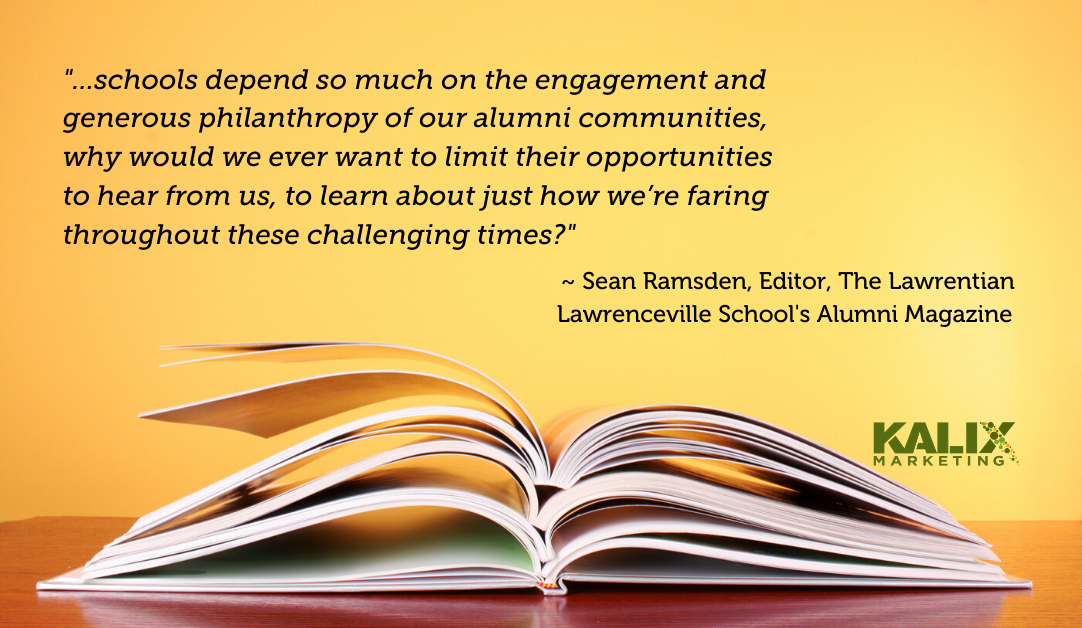In early March, we interviewed Sean Ramsden, editor of The Lawrentian, The Lawrenceville School’s award-winning alumni magazine, about creating engaging magazine content.
Then the pandemic hit and schools across the country pivoted to remote learning.
Now, as schools navigate new instructional, enrollment and fiscal territory, magazine editors and communications managers are struggling with how best to address tough public health and social justice issues in print. Many communications departments are now also advocating for continuation of the magazine’s budget.
Once again, we turned to Sean to help guide us through today’s challenging school publication issues. (And his original advice from March is linked below – very much worth a click!)
How are you dealing with the pandemic in your content for your summer and fall issues?
Sean: We were able to get a bit of pandemic content into our spring issue, which was published in May. All the editorial and much of the design and layout were complete by the time we began sheltering at home in mid-March, and neither would have held over well until the summer or fall issue.
We decided to go ahead with just about everything as planned, but with a full page in the news section devoted to Lawrenceville’s quick pivot to distance learning for the spring term, which began March 30. At the bottom of the page, I included a little editor’s note that the pandemic was spreading to our area as production on the spring issue was closing and that there would be a comprehensive look at how we adjusted in the summer issue.
I didn’t want our alumni readers to not have a magazine for the spring, which was the only alternative, given that there just wasn’t much to say about it yet at that time. The pandemic was here, and we reacted appropriately, but to wait until we saw how everything worked would have meant holding everything until at least July.
Also, in late March, I got an email from my uncle, who always reads every issue from cover to cover before sharing his thoughts. He had just finished the winter issue, which I sent him in February. He remarked that it was nice to read something where the world seemed normal again. That resonated with me and affirmed my decision to move ahead with our planned spring content.
We also always run letters from the editor and the headmaster, so we both composed something fresh and timely, imploring readers to stay safe and healthy as we make our way through this together. Those were dropped in right before the proofreaders got their copies. Interestingly, I was actually battling COVID-19 at that very time, though my case was mild enough where I was able to hammer out that message.
We’ve made our summer magazine into the coronavirus issue. I’ve never done a theme magazine at Lawrenceville, but how can we not adapt this entire issue to the pandemic? It’s universally relatable to our readers, and I think that the entire spring term being conducted in ways unlike class has ever been conducted in our 210-year history is actually quite fascinating. We also have alumni who have responded in some of the most interesting ways to the pandemic, whether on the front lines, or organizing relief, or even producing innovative technology making jobs easier and safer for health care workers. They’re all stories we want to share.
What about Class News submissions that may have been received prior to early March that include mention of alumni pre-pandemic summer plans?
Sean: Except for a handful of the usual latecomers, just about all the Class Notes submissions were in by early March, when everything was changing so rapidly. The reunion classes were talking about seeing each other in early May for Alumni Weekend and many others had big travel plans for the summer. There were perhaps two or three actual mentions of the novel coronavirus, but none that acknowledged how everything was about to change.
I went through the entire section, which usually runs about forty pages in print, in late March and altered those notes that now contained objectively untrue content: Reunions were postponed until next spring, other group get-togethers would be cancelled, and such. Still, the tone of most of the notes didn’t correspond to the general mood of the country, which at that time was fear, or at least heightened concern.
So, I began the Class Notes section with an editor’s note explaining how most of these notes were written and received by The Lawrentian prior to our nation’s protective measures against the spread of COVID-19. While some notes mention the spread of the virus, my editor’s note explained that the full measures were unknown at press time.
Finally, I acknowledged that Class Notes for the next issue or two may strike a more measured tone in terms of news our alumni choose to share – a subtle way of recognizing that what they were about to read reflected a pre-pandemic slice of life. At that time, I honestly had no idea what to expect in the next couple of months in anything, let alone Class Notes!
What has wound up happening is interesting, though. Just about all the submissions for the summer issue are in, and the tone is refreshingly upbeat. So many of the classes have bonded over Zoom happy hours in a way that just wasn’t happening prior to the pandemic. A number of class secretaries have reported that their classmates have become more connected than ever and are meeting – virtually – once a week! Yes, the photo submissions are down somewhat, and I don’t want to run only screenshots of Zoom reunions, but the engagement with each other and with the magazine are blessings. I’m not sure I would have predicted any of that!
With the pandemic’s impact on schools’ budgets, what advice do you have for advancement offices trying to determine whether to cut back on alumni magazine issues, pages, or possibly cut the magazine budget entirely?
Sean: Please do not do this! In my estimation, trying to save money this way is a major miscalculation. Okay, I’m obviously not completely objective here as an alumni magazine editor, but I honestly say this with the school’s best interest in mind: The return on a school’s investment in its magazine is hard to quantify, but I’m certain it is far more than what is saved by cutting its funding, particularly now.
Let’s acknowledge that institutional budgets are being slashed just about everywhere. That’s completely understandable. This pandemic has hit all of us hard and in ways that still remain completely unknown. But given that our schools depend so much on the engagement and generous philanthropy of our alumni communities, why would we ever want to limit their opportunities to hear from us, to learn about just how we’re faring throughout these challenging times?
This is a crisis – a global health crisis and an economic crisis – and the worst thing an organization can do in a crisis is not communicate with its stakeholders. And the magazine is the school’s signature alumni communications vehicle.
We’re not asking for anything directly, but we never do that in The Lawrentian. Our magazine is always about engagement, keeping our alumni feeling actively connected with the school. In terms of the pandemic, we want not only to inform our readers how we’ve handled it, but also to send a message of reassurance. We want our readers to feel that sort of timelessness, the permanence, of our school – the feeling that it will always be here for them, a touchstone in their lives. It’s comforting. And if the magazine dries up, things will feel different.
Still, we want to handle this trust responsibly. We’ve committed to a maximum page count and renegotiated our printing fees. We might spend as much as 20 percent less than we did this past year, and I think we can do that without an impact on the quality of the publication. We haven’t been asked to trim our budget, but I wanted to be prepared in the event that it happens. Just the same, I’m fortunate that our school recognizes that the investment it makes in The Lawrentian is worth it.
 About Sean Ramsden
About Sean Ramsden
For nearly five years, Sean Ramsden has written and edited The Lawrenceville School’s award-winning magazine, The Lawrentian, one of the oldest continually published alumni magazines in the U.S. Recently, both the magazine and Ramsden’s feature writing received Communicator Awards for excellence, the Academy of Interactive and Visual Arts’ top annual honor.
Ramsden has nearly 20 years of experience in digital and print communications, earned media and social media platforms. Prior to joining Lawrenceville in 2015, he was director of communications and brand at the New Jersey nonprofit Bancroft Neurohealth, which serves children and adults with autism. Previous positions include director of editorial services for Rider University and senior editor/writer for Kean University. He holds a B.A. magna cum laude in Communication from Seton Hall University and a M.S. in Communication Management from Temple University.
Click below to read Sean’s expert pre-pandemic advice on creating content for alumni magazines.


